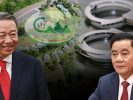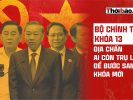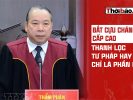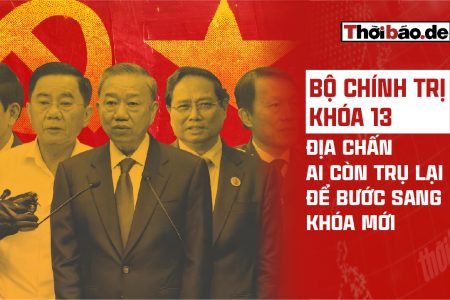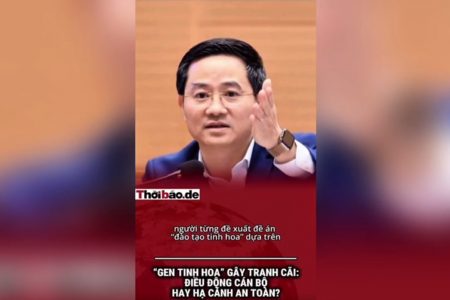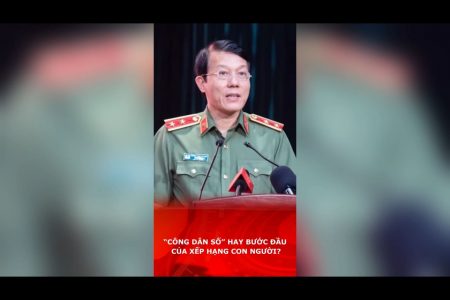Vietnam has just been in the last day of the 15 days of social isolation and now faces the question: should it be strictly quarantined or loosened in order to reactivate its economic engine?
Earlier this week, the image of a foreigner standing on the roadside of Ho Chi Minh City asking for money to buy food became the focus of public opinion. In addition to comments about honor, about kindness, the economic side of the story sparked serious exchanges.

Also in the week, a number of poor people were seen pushing at an ATM giving charity rice in Hanoi.
If the image of the „Western teacher“ vividly illustrates the prospect of people starving to death before dying of the Coronavirus outbreak, it has been a long time since someone witnessed such an incident in the capital.
April 15 is the end of social isolation under the prime minister’s Directive 16, a big question arises: continue to quarantine to control epidemics or gradually loosen to allow the economy come back?
Covid-19 pandemic caused economic, international and domestic trade to decline and stop, the number of bankrupted enterprises increased, the number of unemployed and poor rose sharply.
According to the latest statistics of the Ministry of Planning and Investment, in the first quarter of 2020, nearly 34,900 enterprises withdrew from the market (up 2% compared to the same period last year.
A recent survey by the Vietnam Chamber of Commerce and Industry shows that nearly 30% of businesses can only operate for no more than 3 months, 50% of businesses only last half a year.
Difficult enterprises and dissolution entail unemployed laborers. According to the Ministry of Labor, Invalids and Social Affairs, in February, 47,164 people applied for unemployment insurance, an increase of 59.2% compared to January and an increase of 70% over the same period last year.
When Vietnam applied strict social isolation measures on April 1-15, the economic situation became more and more difficult.
While the policy of „fighting against epidemics like fighting against the enemy“ has brought initial success in preventing diseases, the economic problem is much harder to solve.
Talking to BBC News in Vietnamese, Ms. Vu Kim Hanh, president of the Association of High-Quality Vietnamese Goods, gave an illustrative example:
„Ho Chi Minh City plans to collect VND405 trillion of tax this year, equivalent to VND1.1 trillion a day, or $50 million. Every day of isolation, the city will not only lose that revenue but also spend many billions for treatment, epidemic prevention and relief for the people.“
Talking to BBC News in Vietnamese, Dr. Nguyen Quang A assessed:
„Social isolation helps Vietnam effectively control disease outbreaks, ensuring no outbreaks out of control, but it almost completely freeze the operation of the economy.“
Before the question of whether to loosen and activate economic activities, Dr. Nguyen Quang A shared:
„This is a difficult option. Certainly, if it is found that the epidemic is under control, it should be loosened partially and locally according to the specific situation of each locality to avoid economic losses when it was more dangerous.“
Ms. Vu Kim Hanh acknowledges ensuring „double goals“ is extremely difficult: „Currently, countries share the awareness of two urgent tasks: saving the lives of the people, which is the most important, the second is the health of the businesses, which are also the economy. In fighting the disease, the most important is the social distance, and implementing the distance has achieved health benefits but it has suffered a great deal of freezing economic activities. I believe the Vietnamese government understands more than anyone else, our country does not have a public reserve fund so large that it is safe to close its economic activities long enough. But eliminating the social distance would allow the disease to break out and the government would not dare to.“
The economic problem is a recent focus of the Vietnamese Government. In the latest directive speeches, besides the policy of „fighting against epidemics like fighting against the enemy,“ Prime Minister Nguyen Xuan Phuc has constantly emphasized the „dual goals“ and is determined to bring the economy to recover soon.

Dr. Nguyen Quang A said: „There is no optimal solution and it is always a very difficult trade-off. The PM said that he must achieve the dual goal, which is to control the pandemic and to protect the economy. That is the right approach.
He also talks a lot and listens to the public to adjust policies (for example, exporting rice). I think the most important thing is to understand the situation, make policy decisions based on evidence, the policy will be better.“
To revive the economy, the Vietnamese government has launched a series of measures, including monetary support package (raised to about VND300 trillion), fiscal support package (about VND180 trillion) „We have a ’steel punch‘ as the public investment capital of nearly VND700 trillion dong, equivalent to $30 billion which is needed to disburse all this year.“
Regarding the solution, Ms. Vu Kim Hanh analyzed:
„The support of businesses this time is completely different from the old support concept. So it is necessary to save businesses to save the economy, which is a must to do if you do not want the economy to collapse. Now rely on luck, conduct domestic economy in the most concentrated conditions possible, and at the same time make full use of external opportunities such as contracts for the performance of masks and medical equipment, if any.“
Discussing the localities proposed to continue social isolation (from 1 week to the end of May), Dr. Quang A assessed: „Local leaders are hard to take the initiative in this situation (fear of responsibility, the 13th Congress is approaching, …) and they are often passive in the tightening direction. That’s why the government should have clear instructions. I think after April 15, it is best to open each section, each locality and closely follow and adjust in time.“
Ms. Hanh said that the social distance has brought good results durign the pandemic, but also noted: „Prohibition is easy, for partial economic recovery is much more difficult, but can not suspend for forever.”
She also shared the fact that it is difficult to immediately remove the social distance:
„I believe spacing will continue, cannot be undone, and return to normal, but how will it continue? There should be immutable principles. Spacing is still the first and most important solution.“ Vietnam is poorer than other countries, spending to prevent pandemics is not the same as rich countries. Therefore, there must be ways for the economy to recover, not collapse.“
„The business is very tired. Our association consists of reputable businesses in the market but also complains that if they close like this in 2 months, they will bankrupt because there is too much inventory and no liquidity. I guess the government will still have to abide by the most stringent principles but it is time to open a section for businesses to do business,” said Hanh. She said that in the context of „double goals„, „the government is transparent to the people, how much money it needs to save the economy, its country is poor. it can only cover how much money people can call on how much they can contribute, and how much they can borrow internationally, and make up for the lack of money is the belief of the people, a commitment to implement it seriously, effectively and carefully under the control of the people.
She also commented that the current support policy is still inadequate, requiring many procedures to discourage people and businesses.
„If you want to support the workers, the enforcement agency requires workers to prove that their company has suffered serious damage to bankruptcy because of the disease, how can it be proven? Or borrow from the bank.“ When they are in a tight situation, they still have to submit mortgages, fully mortgaged assets, submit plans or loan security contracts, so the enterprises will “give up,’” she said.
Ms. Hanh suggested that the government solution must have a risk guarantee fund for the bank, „because the bank is also a business unit, otherwise the two sides will pull in no way out or there is a way out …“ pole„. She also noted that in the current context, the government should consider directing or banning the sale of Vietnamese companies to foreign-owned companies.
The World Bank said that Vietnam „has begun to take advantage of the unpredictable volatility“ of the current global financial market because of the Covid-`9 pandemic and economic growth may be reduced to 4.9% as well as „increasing the poverty rate in the first half of 2020.“
“In the first few months of 2020, inflationary pressures persist due to high food prices at the end of the year combined with the possibility of goods shortage due to trade restrictive measures during the Covid-19 pandemic. Manufacturing, tourism, and transport industries dropped sharply in the first two months of 2020,” the World Bank said in an updated economic situation report entitled “East Asia and the Pacific during the Coronavirus” released on March 31.
„Vietnam has started to ‘taste’ from the unpredictable volatility of the current global finance, stock prices plummet, national credit risk increases, and investment capital flows decline.“
The international financial institution further commented that „with a policy space at hand, Vietnam is in a strong position to overcome the ongoing health and economic crisis,“ citing the evidence that „In the first two months, exports grew by 8%, FDI inflows amounted to $2.5 billion, and retail grew by 5.4%.”
The World Bank believes that although the prospects for Vietnam’s economy are still favorable in the medium term, GDP growth will be negatively affected, and the economy’s growth rate “could be reduced to about 4.9% in 2020.”
In addition, „inflationary pressures are expected to rise temporarily, reflecting uncertainty about food and fuel prices, as well as the potential for trade disruptions.“
The specter of the Covid-19 pandemic is also covering Vietnam’s economy.
The latest survey of the Private Sector Development Research Board (Committee IV) on 1,200 businesses about the impact of Covid-19 on business activities shows that if the Coronavirus pandemic lasted 6 months, then 74 % of businesses may be bankrupted.
The main reason is that revenue cannot compensate for activities such as salary payment, bank loan interest, space lease … In addition, nearly 30% lost 20-50% of revenue, 60% of businesses lost even more than half their revenues.
The groups that are seriously and immediately affected are aviation, tourism (accommodation, hotels, dining), education, textiles, footwear, furniture manufacturing …
The Covid-19 pandemic also causes production to be stagnant, trade is limited, agriculture, retail and international capital flows are also „hit„.
Aviation industry lost over $1 billion
According to the forecast of the Vietnam Aviation Administration, the complicated developments of the pandemic may affect the revenue of Vietnamese airlines about VND25,000 billion in 2020.
In particular, Vietnam Airlines expects revenue to decrease by VND12.5 trillion, Jetstar Pacific expects to reduce income by about VND732.8 billion. Up to now, the industry’s revenue has dropped by VND25 trillion.
On April 15 PM Phuc agreed that 12 provinces and cities would extend their social isolation until April 22 or April 30 at the Standing Government Meeting on Covid-19. With this decision, the Vietnamese economy will continue to plummet, millions of poor households, although promised by the State to provide financial assistance, but they have almost received nothing but hunger has come.
Trung Nam from Da nang – Thoibao.de (Translated)

















